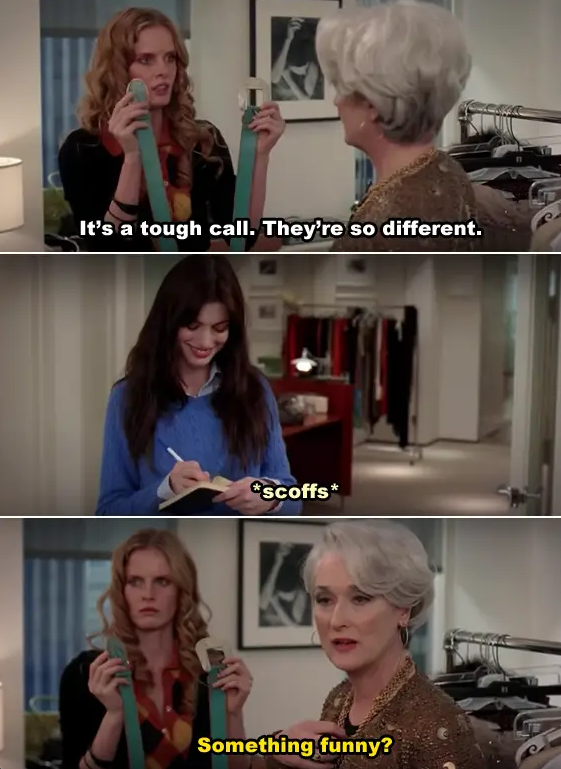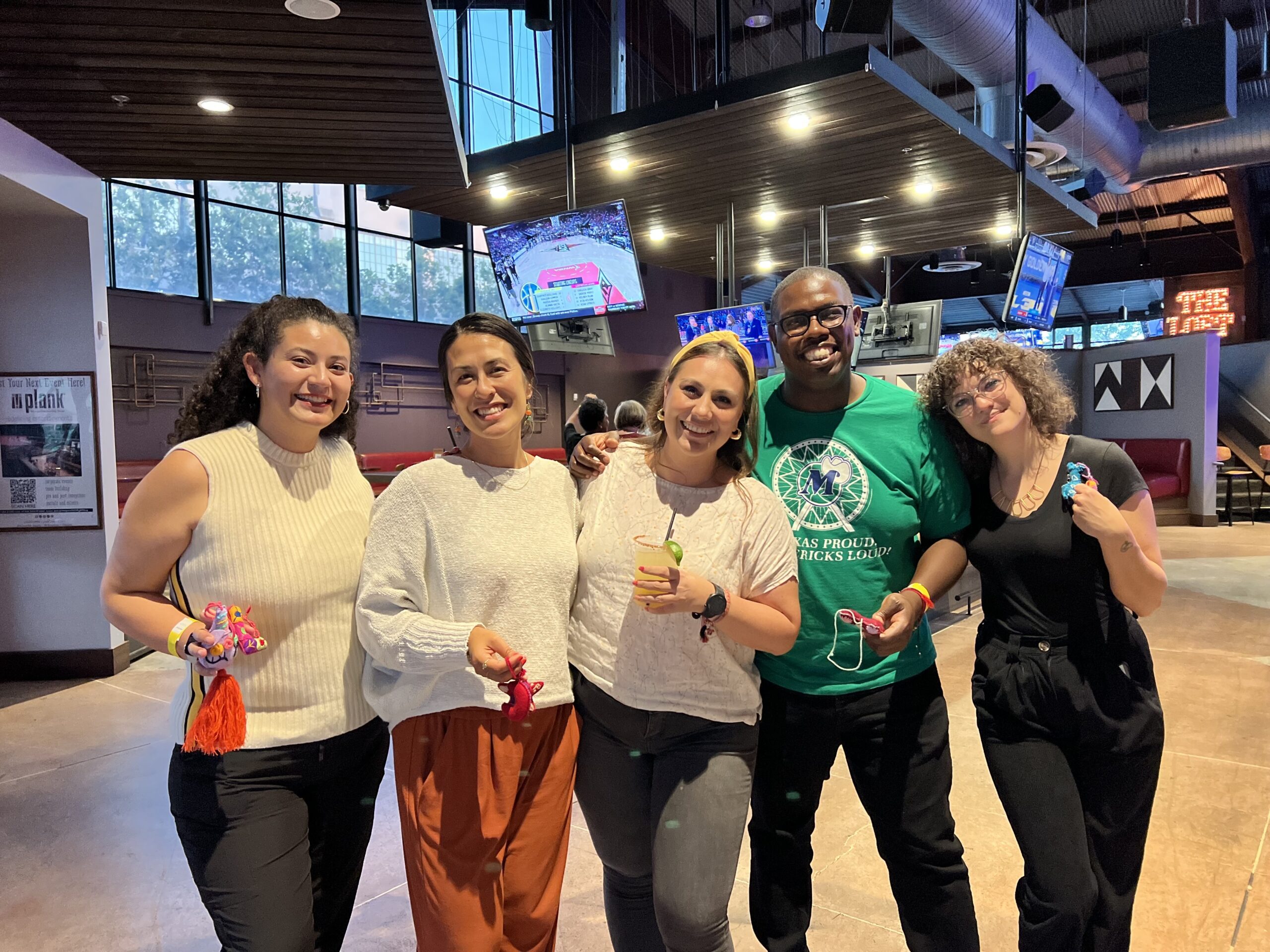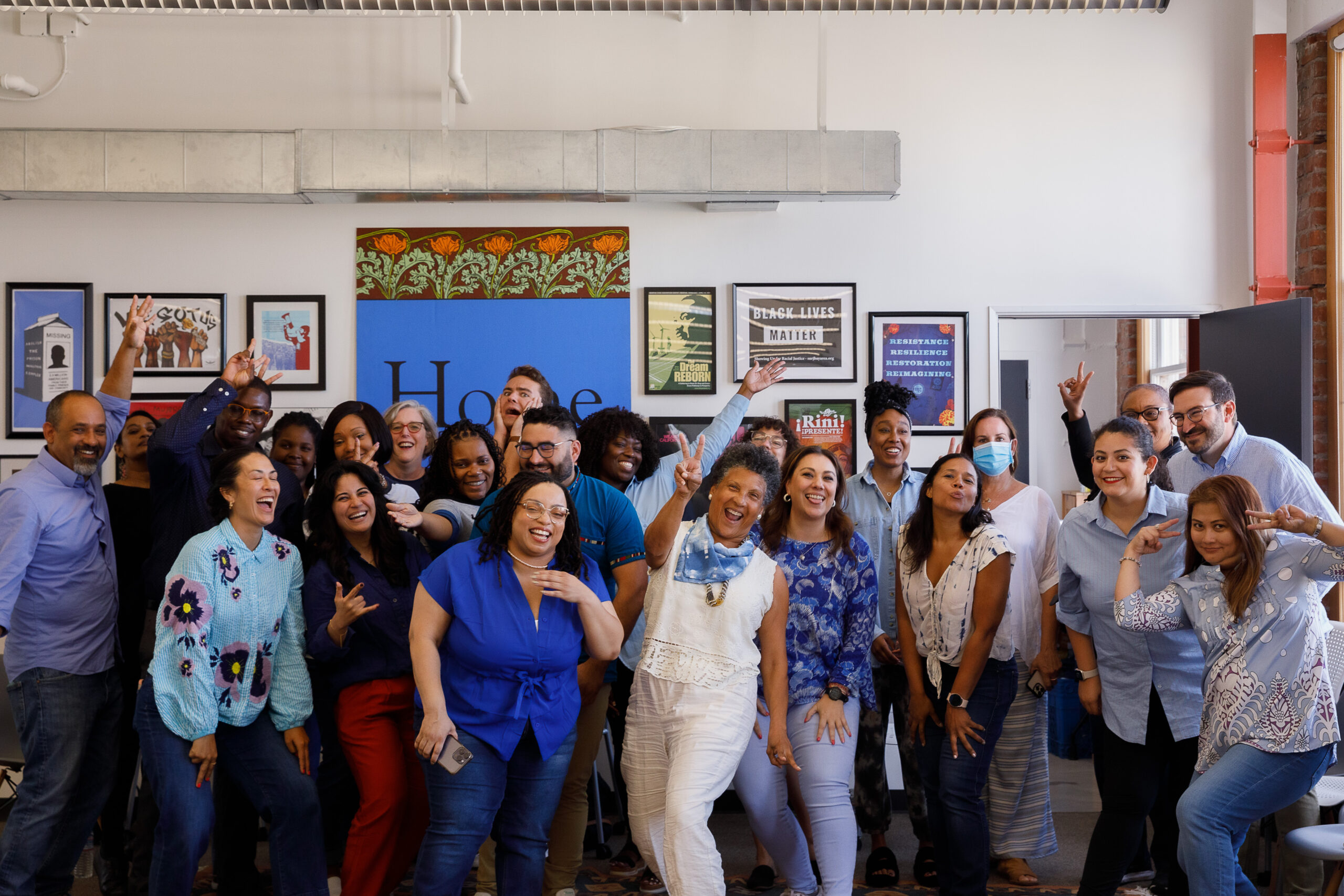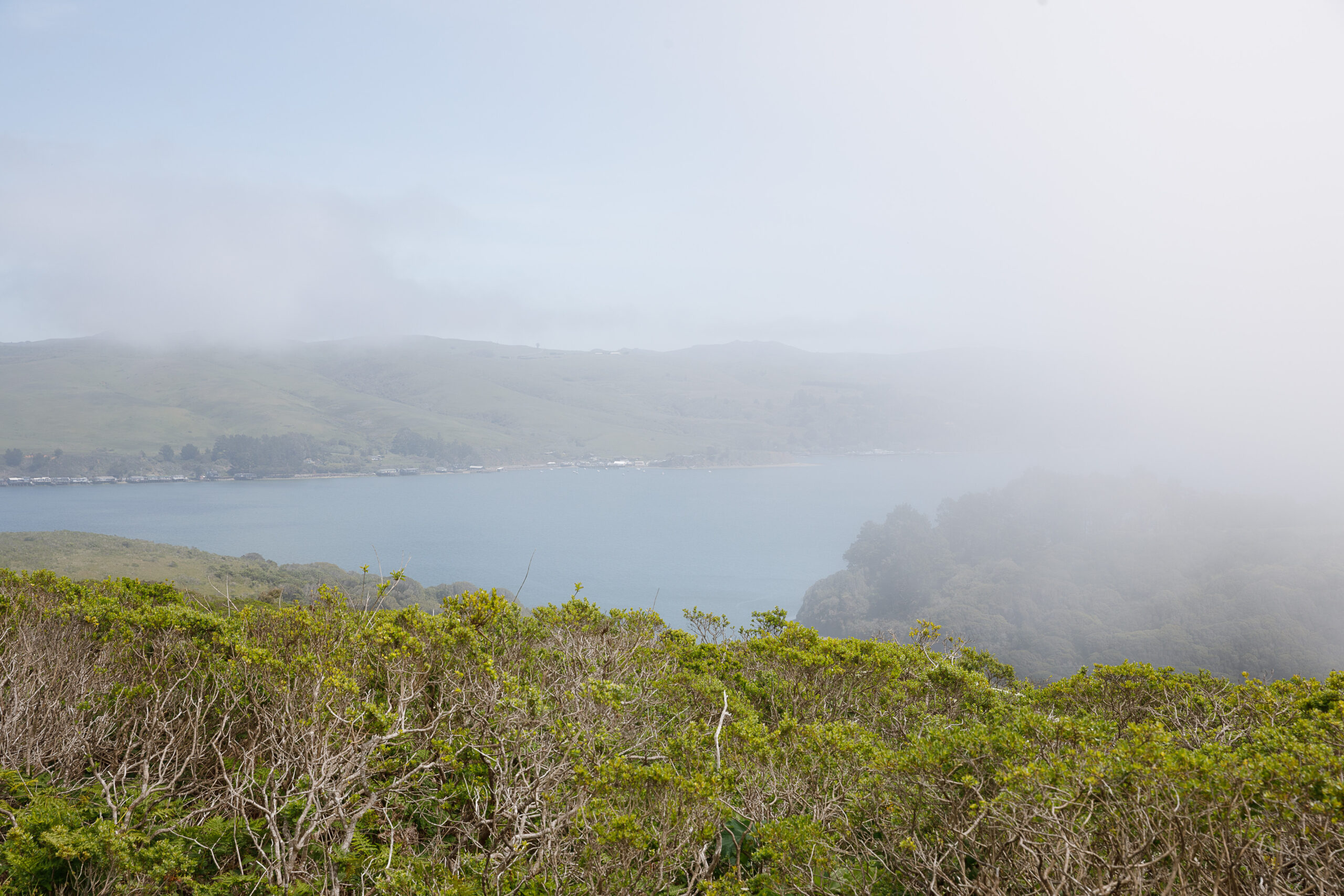MSC on Essential Mindset Shifts for Stronger Movements
What do you think of when you hear the word conflict? Maybe it’s that tense moment in a scary movie — spooky music and squeaking doors. Maybe it’s on the news — clashing heads of state and political unrest. Or, maybe it’s the shocking twist in that prestige drama you’re watching. Conflict is everywhere — headlines, your TV, and, of course, in your daily life.
But is conflict inherent in our nature, or is it a byproduct of our upbringing and experiences?
Defined simply, conflict implies a clash — the tangible blows of war or the intangible strains of opposing ideals or desires. It’s the internal battle of conflicting needs and it’s the exhilarating face-offs in our favorite stories and at our kitchen tables.

Conflict can feel like a constant in our lives. And perhaps it is. While some might dismiss a particular disagreement without a thought, for many, a conflict can hold deep meaning. Every day, whether we move on quickly or dwell, we are navigating through a series of conflicts.
The world of philanthropy is no different: passionate discussions about which projects to support, differing opinions on how best to allocate resources, strategic dilemmas around mission statements or five year plans, and the internal and interpersonal battles of balancing idealism with practicality. These conflicts, big or small, overt or subtle, systemic or relational, shape our daily experiences and mirror the personal and societal struggles depicted in those movies and television shows. Conflict propels every narrative forward, breathing life and movement into the story.
Developing Regenerative Stories
For over two decades, MSC has been dedicated to fostering an equitable intermediary model that nurtures an ecosystem for effective activism in support of a Just Transition. In our work — movement support for racial, social, and climate justice — we witness the myriad ways communities come together, for better or worse. That knowledge offers a basis for the conflict we discuss in this essay. First, it’s crucial to delineate between two distinct types of confrontations, or conflicts, that arise. On one hand, we have healthy conflict — where community members stand on opposing sides of an issue or resolution, challenging one another in constructive ways to bring about growth, change, or compromise. On the other, there’s violence — deeply rooted in the traumatic legacies of brutal colonization, enslavement, heteropatriarchy, and abuse. This type of violence is bigger than a disagreement and can result in profound, lasting harm. Though it is important to remember that conflict is a natural aspect of any relationship, our ultimate goal is to understand and navigate without causing harm.
Philanthropy at large has the opportunity to shift practices away from habits that cause harm toward behaviors that shape a regenerative world. MSC’s Chief Advancement Officer, Mohini Tadikonda, explains that various philanthropic models, including traditional and participatory grantmaking, intermediaries, donor advised funds, and special interest funds, can set the stage for reshaping the dynamics of power and control in wealth distribution. Still, these can miss the mark. Tadikonda observes, “there’s a current trend in philanthropy leaning towards what’s termed ‘participatory grantmaking.’ However, this often comes with a contradiction, as funders are still imposing their own expectations and dictating terms.” This approach can force grantees into collaborations — and conflicts — with unfamiliar partners and into unfamiliar waters. This approach, like a sailor imposing a course without regard for the weather, leads to strained partnerships and missed opportunities for genuine collaboration.
Like navigating a sailboat, managing conflict or crisis demands adaptability. At sea, one adjusts their sails to suit the wind and rain. Likewise, navigating conflict requires dynamism and an understanding of individual players and surroundings. The same applies to philanthropy — consider sudden shifts in funding priorities and entrenched power dynamics. This highlights the need for philanthropy to adopt a more balanced and responsive approach — the way a seasoned sea captain is attuned to the ocean’s moods.
"Everyone can be the navigator our earth needs. Every person on earth can help navigate us to a healthy future where our Island Earth is safe and thriving again.”
Insights published by MSC’s 2015 Transitions Labs served as a foundation for our organizational identity by asking the questions of who we want to be and how we navigate toward a regenerative world. Julie Quiroz, before founding Movement Strategy Network partner New Moon Collaborations, offered her insights during one such Transitions Lab. She reflected, “we faced the realities of our movements — the habits that hamper our effectiveness and the immense challenges before us. However, we weren’t confined by these realities. The lab propelled us towards a vision of exponential and irreversible transformation, a new ‘destiny’ that we have the power to forge and embody.”
This vision, years later, still ignites our dedication to transformative thinking, an essential tool in guiding us towards solutions that are both regenerative and healing. We draw inspiration from the Polynesian story of the Hōkūleʻa and the ethos of wayfinding — a millennia-old seafaring tradition devoid of modern navigational instruments. Instead, wayfinding relies on celestial bodies, oceanic patterns, and wildlife to carve pathways across the seas. It’s a practice that teaches us that “everyone can be the navigator our earth needs. Every person on earth can help navigate us to a healthy future where our Island Earth is safe and thriving again.”
“Stories of hope and local solutions that blend Indigenous wisdom with other best practices can be found all over the world. If we find and share those stories with each other, we can help chart a positive course for our planet.” Sahana Chattopadhyay, a writer and organizational development consultant, suggests that wayfinders are born “in response to the pluri-crises of our times and embody a world that moves from artificial growth and scarcity to the paradigms of abundance and enough-ness.” These ways of thinking encourage us to recognize our inner wayfinder and embrace an ethos of navigating conflict that fosters regeneration. Similarly, philanthropy at large, and especially equitable intermediaries, should advocate for and fund frontline “wayfinders” while pointing out risks like replicating dominance models or enabling inefficiencies.
“You can't meaningfully agree until you meaningfully disagree.”
MSC has always been an organization of wayfinders. And, in the context of our own organizational journey, we’ve navigated the fluctuating tides of change — be it through staff transitions, shifting priorities, new initiatives and programs, or environmental changes. Our lore is rooted in the Practices of Transformative Movement Building (TMB), which means we are committed to weaving connections and fostering resilience within our communities, thereby growing our “capacity to generate collective action in complexity and uncertainty.” This commitment is a compass point, the Strategic Navigation pillar of TMB, and it guides us through both calm and stormy seas with purpose and adaptability.
Relationships are at the Root
People may encounter challenges with peers or colleagues even amid the most well intentioned community-building and social movement work. But conflict is not a failure. We must recognize that conflict is a natural part of any group dynamic and a group without conflict may actually be dysfunctional, unbalanced, or cultish. Conflict shouldn’t be avoided, and it isn’t necessarily an opportunity to achieve deep alignment. As Autumn Brown said during an Instagram Live session, “you can’t meaningfully agree until you meaningfully disagree.”
Communities have answered the call to resolve conflicts in transformative and regenerative ways — organizations like the Karuna Peacebuilding Center have invested in long term partnerships with conflicting partners to help those parties discover their shared capacity for building peace through freely offered training guides on reconciliation and healing. Turning Towards Each Other: A Conflict Workbook, by Jovida Ross and Weyam Ghadbian of Weyam Healing Conflict and Transformation, a Movement Strategy Network partner, also provides a set of activities for both individual and group reflection, focused on enhancing self-awareness and the best practices for navigating interpersonal conflicts.

At MSC, we understand movement building is relational work, and not merely a series of one off interactions. Conflict can arise when a party does not feel considered. True power, as we see it, emerges from sustained collaboration and a sense of shared community. Evolving from monthly gatherings to quarterly town halls, the Movement Infrastructure Innovation Center (MIIC) at MSC — which manages our fiscal sponsorship services — has crafted a dedicated forum for projects to come together. These meetings will serve as a conduit for addressing concerns, disseminating updates, and enhancing transparency between our core team and the project directors of each fiscally sponsored project (FSP).
Each of these gatherings can serve as a nexus of incubation and acceleration, inviting every project into a dynamic arena where feedback loops, networking opportunities, and adaptive improvements thrive. This iterative design ensures every voice is heard, each concern is addressed, and helps determine priorities, making each individual within our community a key player in the evolution of our collective work.

In December 2022, we formulated a strategy to bolster fundraising support for our FSPs after being awarded the Clarence E. Heller Charitable Foundation’s Environment & Health program grant. This generous funding enabled us to provide enhanced capacity building services, align funding strategies more effectively within the ecosystem, and offer specialized technical assistance — a direct response to the recurring and often systemic challenges and conflicts faced by the projects we support. Through an interactive and collaborative design process, we centered on building a fundraising initiative that meets the needs of our projects by addressing strategies and overcoming hurdles stemming from philanthropy’s long history of maintaining structural oppression. Our approach is relational and solutions-focused, redesigning and redefining philanthropic systems to provide accessible workarounds and eliminate red tape that so often keeps communities from accessing the support they need.
Naturally, these relationships — not just with FSPs but among core staff — have encountered their share of conflicts. This doesn’t mean we aren’t good people or are intending to cause harm. It does mean we are all capable of inflicting harm. Reflecting on how we’ve moved forward (or sometimes stagnated) through conflict, there’s a consensus among staffers that there’s room for improvement. Weyam Healing & Conflict Transformation has been a helpful tool for navigating such conflict within our organization. Ross and Ghadbian write: “when we avoid conflict or move through it carelessly, we end up acting out those structural patterns unconsciously, even if we are from an identity harmed by those systems. Whether or not we have formal power, we can enact subtle and gross forms of anti-Blackness, White supremacy, sexism, homophobia, transphobia, ableism, classism, and other structural oppressions. This can end relationships, organizations, and movements.”
Mind-Body Harmony for Sustained Leadership
Social change leaders face a daunting balancing act: orchestrating operations, securing funding, staffing up, and, crucially, working to stand out and build relationships among their peers and philanthropy — when their true calling is to support communities and reform inequitable systems. These often conflicting priorities can make leadership roles feel unsustainable and stir conflict. While transactional duties threaten to deplete a leader’s vitality, transformational support mechanisms such as peer circles, coaching, and advocacy work offer vital sustenance. These nurturing supports not only help sustain leaders but also foster relationships that propel initiatives forward. Equitable Intermediaries are pivotal in this, providing a spectrum of support from fiscal sponsorship and personnel management to coaching and training.
RVC Seattle embodies a liberatory and leaderful approach to social justice through BIPOC-led collaborations and equitable power sharing. They serve as a key player in the Equitable Intermediary Fund cohort at MSC, which supports intermediaries that provide financial and technical support to grassroots leaders and are working to equitably redefine intermediary services with best practices, tools, and resources that intend to help more intermediaries move toward this paradigm shifting model. But supporting staff is also crucial. Like RVC, MSC is dedicated to the professional growth among core staffers, which includes enhancing our approaches to managing conflict. As beneficiaries of a Chan Zuckerberg Initiative grant, our team engaged in professional development and wellness workshops including those aimed at expanding our conflict resolution skills — a boon that can last only as long as the funding does.
“When faced with conflict, how do we call awareness to our body's response? Where is that tension physically felt?”
Staffers are encouraged to participate in courses and learnings that resonate with them personally. Karmella Green, a MIIC team project advisor at MSC, took part in a community session called Organizational and Interpersonal Conflict. Hosted by Dana Silverman, the session offered valuable insights into the transformative potential of conflict management. She reflects, “when faced with conflict, how do we call awareness to our body’s response? Where is that tension physically felt?” This meditation, she explained, led to an understanding of how internal conflict manifests physically and, consequently, affects our interactions. Green underscores the importance of recognizing bodily responses — knots in the stomach, jaw tension, tight muscles — and the practice of verbally acknowledging these sensations during conflicts. She advocates for creating a container for conflict, a dedicated space to address disagreements with consent from all parties, and she uses mindfulness techniques such as breathing exercises or meditation to reset before re-engaging. “By building this container and seeking consent for dialogue, we can harness conflict as a regenerative rather than a destructive force.”
For more practical wisdom on collaboration and conflict resolution, we suggest the Management Center, worker-owned cooperative principles, and union organizers including Jane Mcalevey.
Building Regenerative Habits Towards Progress, Not Perfection
Understanding the distinction between a habit and a practice is vital in both personal growth and movement building. A habit, Norma Wong astutely observes, is “any unconscious repetitive act” that often operates beneath our awareness, thus robbing us of the power inherent in the action. Because habits are not consciously controlled, they can inadvertently dictate our behavior, sometimes to our detriment. This is particularly true in movement building, where unexamined habits can constrain our strategies, limit impact, and cause conflict. As Wong points out, even “good habits” can fail to serve us if they remain unconscious, acting as unseen threads weaving a pattern of thought and behavior we may not intentionally choose.
Conflicts can escalate from our unexamined habits, particularly in how we react or respond to challenges. These reactions are not just mental or emotional; they are also somatic, rooted in the body’s unconscious patterns and reinforced over time. When faced with tension or disagreement, our habitual responses — a quickened pulse, tensed muscles, or a rush of adrenaline — can dictate our actions before we’re even fully aware of them. These somatic underpinnings can escalate conflict rather than resolve it.
In contrast, a stance, breathing, or other wellness practice can allow for a more mindful and measured approach to conflict. This regenerative approach is not innate; it requires the conscious practice of stepping back from the brink of habitual reaction to consider the potential for positive change. Just as a weightlifter increases capacity with each lift, each conflict presents a unique opportunity to hone our ability to respond with patience, empathy, and a focus on mutual growth. Over time, what begins as a deliberate practice can evolve into a more natural response — each conflict becoming a set of metaphorical weights, with lifting either reinforcing our habitual reactions or building muscles of resolution and understanding.

Through practice, we can replace unhelpful habits with conscious, deliberate, and strategic actions, fostering deep and respectful awareness. In the aforementioned Turning Towards Each Other: A Conflict Workbook, Ghadbian reminds us, “conflict is neutral. It is neither ‘good’ nor ‘bad,’ it just is.” By utilizing resources like their workbook, individuals can effectively address tensions within their group and collaborate more effectively toward dismantling oppressive structures and establishing sustainable alternatives.
That’s not to say we have absolved our organization from conflict. Since our first all staff retreat in September of 2023, our team has acknowledged sources of conflict and begun to discuss and commit to transforming counterproductive habits into intentional actions. Green captured the essence: “even when it gets rocky, we really do have some solid, compassionate folks that work here.”
Just as a weightlifter mindfully increases their capacity with each lift, each conflict presents a unique opportunity to hone our ability to respond with patience, empathy, and a focus on mutual growth.
In the same vein, MSC’s executive director, Carla Dartis shared an experience during her appearance on the BIG We Podcast. Facing challenges as a leader of color, she said she “needed to hang in there,” but could only “stay quiet or just adapt” for so long. “There comes a point where I need to balance grace with mindfulness because I realize we’re in this for the long haul.” Dartis’ words highlight the essence of mindful resilience — striking a balance, adapting when necessary, but also speaking up and maintaining composure. Keeping our eyes on the prize — a Just Transition towards a world beyond extraction and domination — requires this kind of mindful perseverance.
This approach is reflected in the role of Director of Community Fund Design, a new position at MSC. Stephanie Imah joined MSC in 2023 and works to apply learnings from past regranting experiences where we witnessed or experienced harm, to pilot new models through innovative special interest fund work. This includes a Health Equity Fund made possible by the Robert Wood Johnson Foundation’s health model. The fund, still in its design phase, will support health equity with a participatory grantmaking model shaped by diverse perspectives including BIPOC, low income residents, and others impacted by systemic health inequities, along with individuals knowledgeable in public health, healthcare, and social services. Additionally, the fund’s grantees will be offered a comprehensive range of capacity-building tools, training, and technical assistance to support their health and social service initiatives. Crucially, this programs’ participatory grantmaking model will serve as a pilot for future participatory models at MSC.
At the heart of building power through conflict is recognizing that we’re not perfect — nor do we want to be. The key is to be in relationship with each other, even when it means confronting failure. And we should not fear failure, as it is simply an opportunity to learn and grow. Consider the fifth principle of Emergent Strategy: “never a failure, always a lesson.” We must take the time to understand the lessons that failure presents, and identify what hurts and what practices we need to develop to navigate similar situations in the future. It’s also important to consider how forgiveness plays a role, and whether we are willing to show up and do the work necessary to move forward. By embracing imperfections and learning from failures, we can build stronger relationships at work and in our communities, ultimately fostering a more just and equitable society at large.
Get Comfortable with Being Uncomfortable
Conflict is an inescapable part of our existence, with others and within ourselves. As we navigate the nuanced world of philanthropy, it’s important that we not only acknowledge these conflicts but actively engage with them, rather than shying away. By doing so, we nurture and strengthen the very relationships fundamental to our collective wellbeing and progress. When we approach conflict as an opportunity for growth, our interactions evolve into productive encounters that strengthen relationships rather than strain them.

As philanthropy evolves to embrace conflict, so must the sector relinquish its control of wealth, its stronghold on decision making, and how it dictates who receives resources and how those resources are used. These dated models must be replaced with trust-based and relational partnerships and unrestricted funding, so the grassroots can drive real change and improve real lives. These are big, sweeping shifts and tensions are bound to arise. That’s okay — perfection is not the goal. Instead, we must listen, learn, and adjust.
It’s hard work, and, in philanthropy, there is no single, one-size-fits-all model or solution. Each situation and community requires unique modifications tailored to specific needs and objectives. What is required is a willingness to adapt, confront the status quo, and embrace both change and conflict in support of movement leaders and communities.
Strategists and thinkers who are shifting philanthropy are not merely intent on healing past wounds; they view conflict as a natural and recurring element of movement building, like the ebb and flow of the tides. As we steer — or wayfind — through complex human connections, we seek a safe harbor of Beloved Community. Doing this requires us to ask ourselves — both on a personal level and within the collective helm of the organizations we navigate: what does our purpose lead us to? What will best take us towards the vision for the world we want? How do we practice our values in this choice? Standing in relationship with our grantees and partners, we remember the guiding star in Audre Lorde’s words: “without community, there is no liberation.”
It’s time we respect conflict, welcoming something so many of us dread to its rightful seat at the table. Don’t see it as a pitfall but as a powerful tool to build a movement rooted in genuine interdependence, resilience, and enduring change.

